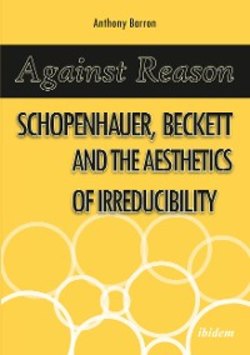Читать книгу Against Reason - Anthony Barron - Страница 10
Introduction
ОглавлениеJust as supreme artworks perennially defy reductive exegesis, the innumerable predicaments of lived experience elude neat categorisations and facile solutions. Beckett’s creative and personal realisations of the impotence of rationality in artistic and existential affairs were, in part, derived from his awareness of the ludicrous pretensions of thinkers who were all too willing to exalt intellection as a faculty upon which we could rely in our theoretical and practical endeavours. Research by critics such as Doherty and Feldman has revealed the extent to which Beckett’s early knowledge of philosophers was reliant upon introductory works such as Mahaffy’s Descartes (1880) and Windelband’s A History of Philosophy (1893). However, the extensive range of intertextual traces of Schopenhauer’s work which are to be found in Beckett’s early writings suggest that his knowledge of Schopenhauer exceeded that which could have been obtained from secondary sources. Acheson claims that Beckett’s “interest in Schopenhauer may have been initially sparked by an editorial in transition [Eugène Jolas’ ‘Notes on Reality’] in praise of the German philosopher”1 which was published in November 1929. While much of Beckett’s initial acquaintance with philosophy was developed through the medium of secondary works, one of the earliest indications of his direct engagement with Schopenhauer’s thought is contained in a letter to MacGreevy from July 1930: “I am reading Schopenhauer” (LI, 32–3). This was, as Van Hulle and Nixon confirm, the point at which Beckett’s “appreciation [for Schopenhauer] started.”2 Elsewhere, Nixon and Van Hulle note that Beckett read a French translation of Schopenhauer by Auguste-Laurent Burdeau in the same year.3 Given Feldman’s view that Beckett’s composition of his ‘Philosophy Notes’ “most likely”4 did not commence until July 1932, it is remarkable that much of his early knowledge of Schopenhauer was derived from primary texts.
Beckett was unusually forthcoming in his professions of enthusiasm for Schopenhauer’s thought. Having stated that he was “not reading philosophy,” Beckett insisted that he did not care whether Schopenhauer “is right or wrong or a good or worthless metaphysician” (LI, 33). The stylistic beauty of Schopenhauer’s philosophy clearly impressed Beckett with its profusive literary qualities, such as its magisterial command of metaphorical depiction. Beckett was particularly fascinated by Schopenhauer’s apparent disregard for the rigid proprieties of logical inference: “it is a pleasure also to find a philosopher that can be read like a poet, with an entire indifference to the apriori forms of verification. Although it is a fact that judged by them his generalisation shows fewer cracks than most generalisations” (LI, 550). Beckett purchased a collected edition of Schopenhauer’s works during his travels in Germany in 1936; they were among the books that he “sent home”5 on November 4th. However, his extensive use of Schopenhauer’s thought in Proust (1931) demonstrates that his familiarity with the philosopher’s work was already well established prior to his study of those German editions. Pilling asserts that Beckett’s absorption of Schopenhauer’s writings was so profound that, “by the time of the Murphy [‘Whoroscope’] notebook [it had] become so much second nature to him as not to need recording, with chapter and verse attached to facilitate re-reading.”6
In his probing study of Beckett’s ‘Interwar Notes’ Feldman describes how Beckett’s summaries of Windelband’s account of Schopenhauer’s thought “point toward both personal affinity and prior understanding.”7 He goes on to claim that, “with the exception of Schopenhauer, and to a much lesser extent Descartes, Beckett did not undertake any philosophical excursus prior to the composition of the ‘Philosophy Notes.’”8 Schopenhauer is scathing in his opposition to those who rely upon introductory texts and commentaries in their study of philosophy:
[O]nly in their own works and certainly not from second-hand accounts can we become really acquainted with philosophers . . . with those histories of philosophy the mind always receives only the movement that can be imparted to it by the stiff and wooden train of thought of a commonplace intellect. (PPI, 196)
Elsewhere, in a statement which typifies his aversion to how philosophy is ordinarily treated within academic contexts, he writes: “I can bear the thought that in a short time worms will eat away my body; but the idea of philosophy-professors nibbling at my philosophy makes me shudder” (MRIV, 393). However, Windelband’s work served Beckett well insofar as it contains an accurate summation of some of the main tenets of Schopenhauer’s writings. Van Hulle and Nixon report that Beckett, in his German edition of Schopenhauer’s work, “marked Schopenhauer’s long praise of Kant and the plea to read his works directly rather than through the mediation of an introduction, for the ideas of such an extraordinary mind do not allow any form of filtering.”9 Given his lack of a formal education in philosophy, it is understandable that Beckett would have been drawn to works such as that by Windelband, but he may also have been struck by how Schopenhauer’s gifts as a prose stylist renders his philosophy eminently accessible. The presiding aim of this book is to show that an intertextual reading of the oeuvres of Schopenhauer and Beckett reveals a vast range of thematic correspondence but I will also highlight how Beckett’s critical and creative practices cohere with Schopenhauer’s own meticulously developed views about the means by which art can engage with conceptual thought.
